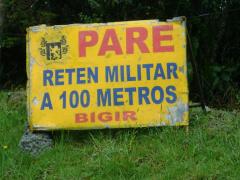Politics and Security in Colombia
You´ve all heard of Colombia and the tremendous security/drug/paramilitary/guerrilla problems they´ve had over the years. Some of you told us not to go here because of what you had heard. We decided to go, however, because of what we heard from the cyclists who had actually passed through: it´s a calm country, beautiful, with incredibly friendly people. And that´s what we´re finding too. We haven´t had any problem, but we do read the paper and we do see the results of the strain they´ve had over the years.
Basically, Colombia got buried under the corruption of drugs and the challenge of a revolutionary insurgency for decades. They seem to be digging their way out over the last ten years or so, and the current president, Alvaro Uribe, is immensely popular for the progress he´s made. The guerrilla group, the FARC, is still there and still holds some very important hostages, some that it's had for more than 8 years. But it seems to be declining in power and influence. You might wonder from reading the paper that their primary reason to keep holding those hostages is that it's their last grasp on power. The FARC seems to be still quite dependent on the drug trade for its financing.
During the guerrilla years, private security forces were created by the big landowners, and developed into what's called "paramilitary forces" here. Essentially, they became private armies in their own right. Several of them have been "demobilized" and information about these demobilized forces and the fact that some aren't really demobilized is in the papers daily. They too are identified with the drug trade.
And of course you all know about the drug mafias of Colombia. Everybody remembers Pablo Escobar and the Medellin Cartel of the 1980's. Pablo was killed in 1993, and Medellin is a calm, safe city. However, the drug trade continues at a high level from various place, with the collaboration of guerrillas and paramilitary and people who just want to be rich, as well as the campesinos who grow the Coca leaf. (Remember that coca is a traditional product used by local people for millenia. However. the market created by the demand for cocaine in the developed world turns it into a different kind of product.)
We have had a bit of experience with the security issues. Every day we ride past military checkpoints. The soldiers are everywhere. Everybody feels that the highways are very safe as a result. However, as we rode through the lowlands we came through an area of great drug influence. In one town, the coca-growing campesinos from the nearby mountains were trying to close the major highway we were riding in protest over the government's coca eradication program. They want more support - if the government is going to destroy their crops in the US-sponsored coca eradication program, they think they should be compensated and helped to move to other crops. We heard about this protest and some occasional violence for days before we arrived in Taraza, but when we rode through nothing was happening. We didn't even see the demonstrators. But we didn't tarry to look for them either.

